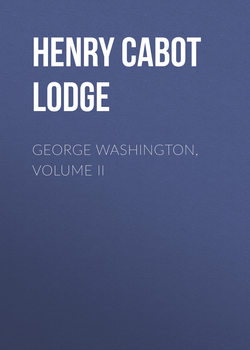George Washington, Volume II

Реклама. ООО «ЛитРес», ИНН: 7719571260.
Оглавление
Henry Cabot Lodge. George Washington, Volume II
CHAPTER I. WORKING FOR UNION
CHAPTER II. STARTING THE GOVERNMENT
CHAPTER III. DOMESTIC AFFAIRS
CHAPTER IV. FOREIGN RELATIONS
CHAPTER V. WASHINGTON AS A PARTY MAN
CHAPTER VI. THE LAST YEARS
CHAPTER VII. GEORGE WASHINGTON
Отрывок из книги
Washington was deeply gratified by his reception at the hands of the people from Alexandria to New York. He was profoundly moved by the ceremonies of his inauguration, and when he turned from the balcony to the senate chamber he showed in his manner and voice how much he felt the meaning of all that had occurred. His speech to the assembled Congress was solemn and impressive, and with simple reverence he acknowledged the guiding hand of Providence in the fortunes of the States. He made no recommendations to Congress, but expressed his confidence in their wisdom and patriotism, adjured them to remember that the success of republican government would probably be finally settled by the success of their experiment, reminded them that amendments to the Constitution were to be considered, and informed them that he could not receive any pecuniary compensation for his services, and expected only that his expenses should be paid as in the Revolution. This was all. The first inaugural of the first President expressed only one thought, but that thought was pressed home with force. Washington wished the Congress to understand as he understood the weight and meaning of the task which had been imposed upon them, for he felt that if he could do this all would be well. How far he succeeded it would be impossible to say, but there can be no doubt as to the wisdom of his position. To have attempted to direct the first movements of Congress before he had really grasped the reins of the government would have given rise, very probably, to jealousy and opposition at the outset. When he had developed a policy, then it would be time to advise the senators and representatives how to carry it out. Meanwhile it was better to arouse their patriotism, awaken their sense of responsibility, and leave them free to begin their work under the guidance of these impressions.
As for himself, his feelings remained unchanged. He had accepted the great post with solemn anxiety, and when the prayers had all been said, and the last guns fired, when the music had ceased and the cheers had died away, and the illuminations had flickered and gone out, he wrote that in taking office he had given up all expectation of private happiness, but that he was encouraged by the popular affection, as well as by the belief that his motives were appreciated, and that, thus supported, he would do his best. In a few words, written some months later, he tersely stated what his office meant to him, and what grave difficulties surrounded his path.
.....
Great political organizations, as we have known them since, did not exist at the beginning of the government, but there were nevertheless two parties, divided by the issue which had been settled by the adoption of the Constitution. Washington took, and purposed to take, his appointees so far as he could from those who had favored the Constitution and were friends of the new system. It is also clear that he made every effort to give the preference to the soldiers and officers of the army, toward whom his affectionate thought ever turned. Beyond this it can only be said that he was almost nervously anxious to avoid any appearance of personal feeling in making appointments, as was shown in the letter refusing to make his nephew Bushrod a district attorney, and that he resented personal pressure of any kind. He preferred always to reach his conclusions so far as possible from a careful study of written testimony. These principles, rigidly adhered to, his own keen perception of character, and his knowledge of men, resulted in a series of appointments running through eight years which were really marvelously successful. The only rejection, outside the special case of John Rutledge, was that of Benjamin Fishbourn for naval officer of the port of Savannah, which was due apparently to the personal hostility of the Georgia senators. Washington, conscious of his own painstaking, was not a little provoked by this setting aside of an old soldier. He sent in a sharp message on the subject, pointing out the trouble he took to make sure of the fitness of an appointment, and intimated that the same effort would not come amiss in the Senate when they rejected one of his nominees. In view of the fact that it was a new government, the absence of mistakes in the appointments is quite extraordinary, and the value of such success can be realized by considering the disastrous consequences which would have come from inefficient officers or malfeasance in office when the great experiment was just put on trial, and was surrounded by doubters and critics ready and eager to pick flaws and find faults.
The general tone of the government and its reputation at widely scattered points depended largely on the persons appointed to the smaller executive offices. Important, however, as these were, the fate of the republic under the new Constitution was infinitely more involved in the men whom Washington called about him in his cabinet, to decide with him as to the policies which were to be begun, and on which the living vital government was to be founded. Congress, troubled about many things, and struggling with questions of revenue and taxation, managed in the course of the summer to establish and provide for three executive departments and for an attorney-general. To the selection of the men to fill these high offices Washington gave, of course, the most careful thought, and succeeded in forming a cabinet which, in its aggregate ability, never has been equaled in this country.
.....